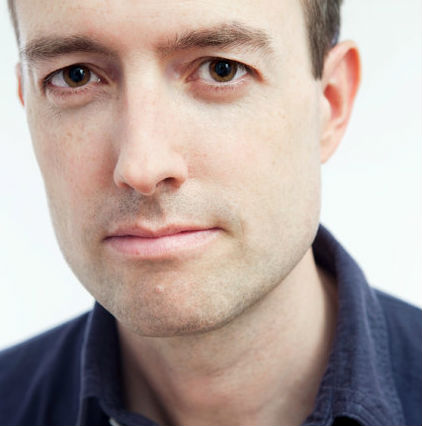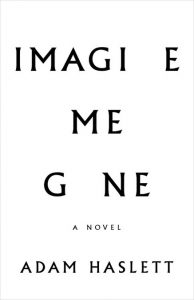Adam Haslett: On Masculinity, Being Fearless, and the Power of Ambiguity

Author: Steven Cordova
July 24, 2016
“Imagine Me Gone is the most personal book I’ve written, since I used the fact there is mental illness in my own family more directly than I have in anything else.”
To sum up Imagine Me Gone (Little, Brown and Company ) as a novel about an affluent family’s struggle with mental illness is to make it sound far more predictable than it actually is. With this novel of familial strife, Pulitzer Prize and National Book Award nominee Adam Haslett moves beyond cliché and immerses Imagine Me Gone in contemporary ideas about racial and economic justice in America—he does so by having each of the five family members serve as alternating narrators.
From the publisher:
When Margaret’s fiancé, John, is hospitalized for depression in 1960s London, she faces a choice: carry on with their plans despite what she now knows of his condition, or back away from the suffering it may bring her. She decides to marry him. Imagine Me Gone is the unforgettable story of what unfolds from this act of love and faith. At the heart of it is their eldest son, Michael, a brilliant, anxious music fanatic who makes sense of the world through parody. Over the span of decades, his younger siblings — the savvy and responsible Celia and the ambitious and tightly controlled Alec–struggle along with their mother to care for Michael’s increasingly troubled and precarious existence.
Author Adam Haslett spoke to Lambda about crafting his new novel, writing nonfiction and the art of creating believable characters.
Since it was released in May, Imagine Me Gone is often described as a novel about a family dealing with mental illness. But the epigraph you chose for the book is by queer author Jean Genet, hardly a family kind of writer, and the first character up as narrator is Alec, the gay son of the family. Can you tell Lambda Literary readers more about how Imagine Me Gone might be seen as gay book?
Sure. The character you mention, Alec, is one of the main characters and his trajectory over the course of the book is in many ways a story about intimacy between men, about becoming a gay man. Alec moves over the course of the book from alienated and anonymous encounters to meeting someone and trying to figure out how to shift into a realm where he can somehow combine sex and intimacy. That’s one of the through lines. One of the other through lines is Alec’s relationship to his father and his older brother. One of the things I was trying to get at in terms of masculinity is that Alec is the one who is in the most control. Alec is able to flourish where the two straight man in the family are not able to “panache” it. So it’s both a gay book and a book about masculinity, about how men cope with their own weakness, their own desires.
I can’t think of any other novel in which two brothers, one gay, one straight, are sympathetic partners in solitude as Alec and Michael. They’re both single and they bond because of their mutual relationship status. Did you have any literary antecedents in mind and, if not, can you tell me more about where the idea came from?
I don’t think I had a particular book in mind. Michael, the older brother who suffers from severe anxiety, is someone who is also deeply committed to the cause of left politics, particularly African-American and racial justice. He’s also a very frantically abstracting character. So when Michael recounts Alec coming out to him, and Michael’s the last member of the family Alec come does come out to, he aligns himself with Alec mainly along the lines of politics, taking it as axiomatic that to be gay is to be left wing. But Michael realizes in that same moment that perhaps Alec needed more than that—more than just an abstract political response. So to some extent, this is just the absurdity and occasional hilarity of this pretty liberal family dealing with all these problems.The issue is not acceptance of homosexuality. The issue is whether there’s going to be any ability to cope with these emotions. But Alec also does see, as you mentioned, the ways in which he and Michael are close because they’re both single, and I guess it’s just, to me, the representation of a complex relationship. There’s lot of single straight men who, like Michael, often feel as alienated from their desires or from being seen as desirable as gay men do.
 Imagine Me Gone expertly captures the social and political context of an era, as well as presenting complex characters and a propulsive plot. Writing this kind of book seems to be your forte. To whatever extent that’s true, what advice would you give a young writer trying to incorporate the Orlando Massacre into a story?
Imagine Me Gone expertly captures the social and political context of an era, as well as presenting complex characters and a propulsive plot. Writing this kind of book seems to be your forte. To whatever extent that’s true, what advice would you give a young writer trying to incorporate the Orlando Massacre into a story?
The first thing I would say is consider whether it’s too soon, simply because the meaning of events of such magnitude and emotional/cultural intensity tend to distill over time in your own imagination and in the culture’s imagination. That said, if you were taking the plunge, I guess I would say the edict to start with is be brave. That is to say, try to imagine yourself outside the lines of narratives that have already been established around the event. Fiction is an exploration of ambiguity and things that are hard to know or pin down, an exploration of the ambivalent states within people. One obvious example is the In Cold Blood approach, which would be to imagine the subjectivity of the killer. That’s done fairly frequently but, you know, there are the narratives created by the news media and groups organizing around it, and they’re obviously purposely contentious. They’re arguments for a purpose. They’re not meant to make things more complex. They’re meant to make things simpler.
Do you think you have a nonfiction book in you?
I do. I think I do. I think it’s a question of subject and narrative. The nonfiction books I find most compelling are ones that offer analysis and that are intellectually probing, but that also tell some kind of story in the process of doing that. While I have written about politics in shorter form, mostly commentary, I haven’t landed on the thing that would be the through line subject. I’ve thought about doing it in relation to gay life. I occupy a kind of transitional generation between those whose immediate generation was impacted by AIDS and HIV, and those ten years younger than me for who the cocktail was there before they became sexually active. There are any number of different subjects. But I haven’t yet written a great deal about my own experience as a gay man.
I’ve heard Michael Cunningham talk about the freedom he’s had to write what he wants to write since having won the Pulitzer Prize for The Hours. How has being nominated for a Pulitzer and National Book Award changed your life?
It changed it quite materially in that it allowed me to pursue writing full time. That was an enormous change. That same advice I just gave on the Orlando question, “Be brave” is the advice I received from my first editor, Ann Cleaves. I think it’s the best writing advice I’ve ever received. It allowed me to continue to believe that being brave is the best thing you can do for your own work, rather than imagining in advance what might be palatable to publishers or audience.
Imagine Me Gone is the most personal book I’ve written, since I used the fact there is mental illness in my own family more directly than I have in anything else. So one of the things that has been a gratifying surprise is that, however specific the novel is about these characters in their own idiosyncratic situations, it seems to have elicited in a lot of readers thoughts about their own families’ struggles and sibling relationships and mental illness and other things. So through specificity, generality! That’s the thing that’s been reinforced for me. You don’t arrive at the general by trying to portray the general; you arrive at it by being true to the specific.
Photo by Beowulf Sheehan

